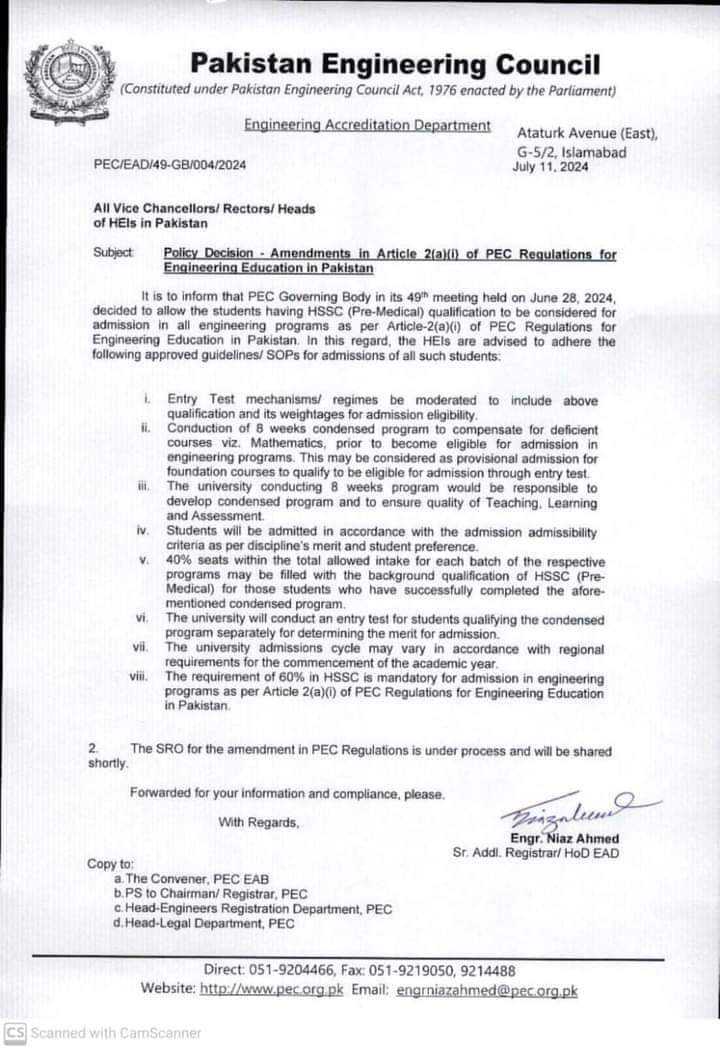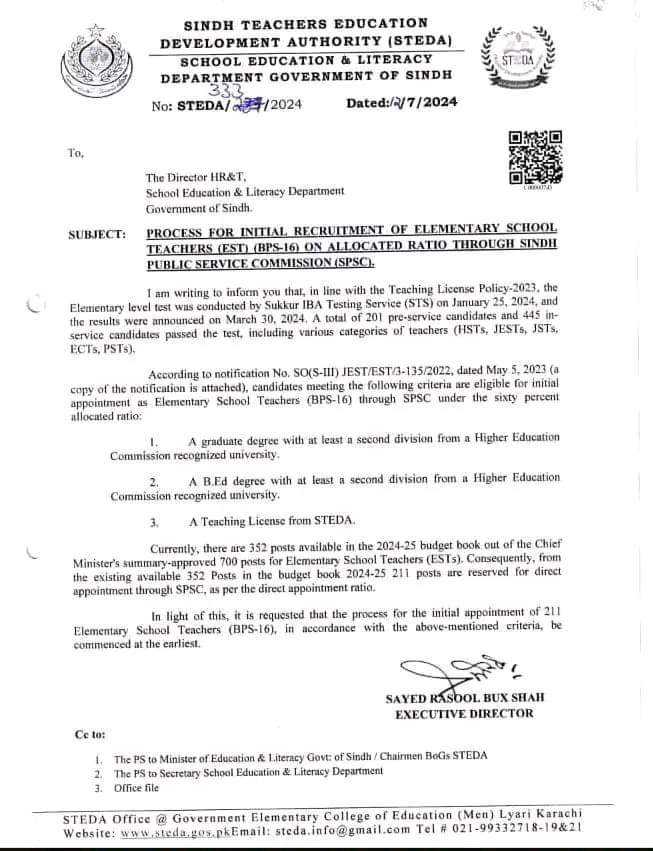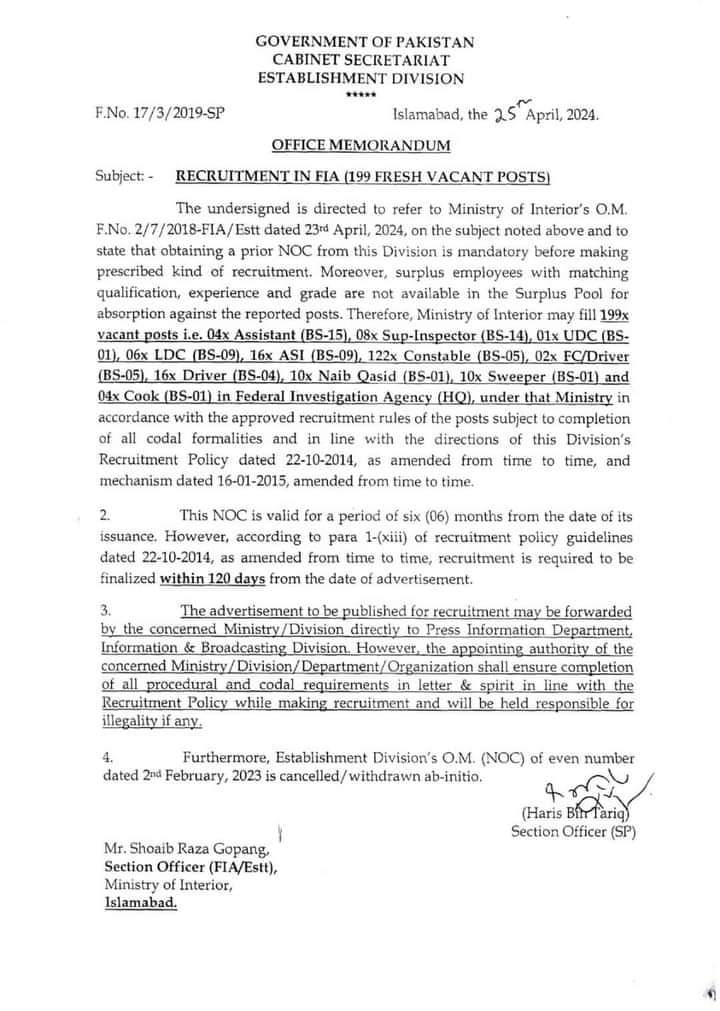Pakistan Engineering Council Amends Regulations to Include HSSC (Pre-Medical) Students in Engineering Programs
In a significant move to broaden access to engineering education, the Pakistan Engineering Council (PEC) has announced amendments to Article 2(a)(i) of the PEC Regulations for Engineering Education in Pakistan. These changes were ratified in the 49th PEC Governing Body meeting held on June 28, 2024. The amendments allow students with Higher Secondary School Certificate (HSSC) in Pre-Medical to be considered for admission into engineering programs across Pakistan. The Higher Education Institutions (HEIs) are advised to follow specific guidelines and Standard Operating Procedures (SOPs) for implementing these changes.
Moderation of Entry Test Mechanisms
To accommodate students with an HSSC (Pre-Medical) qualification, PEC has recommended moderating entry test mechanisms and regimes. This includes adjusting the weightages for admission eligibility to ensure these students are not at a disadvantage compared to those with an HSSC (Pre-Engineering) background. This change aims to provide a fair and balanced assessment process for all prospective engineering students.
Eight-Week Condensed Program
An essential component of this new policy is the introduction of an eight-week condensed program focused on Mathematics. This program is designed to address any deficiencies in the subject for HSSC (Pre-Medical) students. Successfully completing this program will make them eligible for admission into engineering programs. HEIs will conduct this condensed program, ensuring that students acquire the necessary mathematical foundation to excel in engineering studies.
Provisional Admission and Foundation Courses
Students who complete the eight-week condensed program will be granted provisional admission into engineering programs. This provisional status will allow them to further prepare for and eventually meet the full admission requirements. The HEIs are tasked with ensuring that these foundation courses are of high quality, enabling students to seamlessly transition into regular engineering coursework.
Quality Assurance in Teaching and Learning
HEIs conducting the condensed program will bear the responsibility of maintaining high standards in teaching, learning, and assessment. This measure is crucial to ensure that the program effectively bridges the gap for HSSC (Pre-Medical) students, providing them with a robust foundation in Mathematics and other critical areas required for engineering studies.
Merit-Based Admission Criteria
The admission of HSSC (Pre-Medical) students will be aligned with the established merit-based criteria for engineering programs. Each discipline’s merit and student preference will guide the admission process, ensuring that only those who meet the rigorous standards of the engineering field are accepted.
Allocation of Seats
A significant aspect of the policy is the allocation of 40% of the total allowed intake for each engineering batch to students with an HSSC (Pre-Medical) qualification. This allocation is contingent upon their successful completion of the condensed program. This move aims to create a diverse and inclusive student body within engineering programs, reflecting a broader spectrum of academic backgrounds.
Entry Test for Condensed Program Graduates
Students who complete the condensed program will be required to undergo an entry test conducted by the university. This test will specifically determine their merit for admission into the engineering program, ensuring that they meet the necessary academic standards.
Flexible Admission Cycles
HEIs are given the flexibility to vary their admission cycles in accordance with regional requirements and the academic year’s commencement. This flexibility will help accommodate the new intake of HSSC (Pre-Medical) students and ensure a smooth transition into the engineering education system.
Mandatory 60% in HSSC
Despite the new provisions, the requirement for a minimum of 60% in HSSC remains mandatory for admission into engineering programs. This criterion applies to all students, ensuring a baseline level of academic achievement and preparedness for engineering studies.
Pending SRO for Regulation Amendments
The PEC has indicated that the Statutory Regulatory Order (SRO) for these amendments is currently under process and will be shared shortly. This step is crucial for formalizing the changes and providing a clear legal framework for their implementation.
Impact on Engineering Education Landscape
The inclusion of HSSC (Pre-Medical) students in engineering programs represents a significant shift in the educational landscape. This policy aims to harness the diverse skill sets and perspectives of students from different academic backgrounds, enriching the engineering discipline with a more varied and holistic approach.
Addressing Skill Gaps
By introducing the condensed Mathematics program, PEC is addressing a critical skill gap for HSSC (Pre-Medical) students. This targeted intervention will equip them with the necessary mathematical skills to thrive in engineering programs, ensuring they are not disadvantaged by their previous academic focus.
Enhancing Academic Diversity
The policy change is expected to enhance academic diversity within engineering programs. Students from a pre-medical background bring unique perspectives and problem-solving approaches, which can contribute to innovative solutions in engineering fields.
Strengthening the Engineering Workforce
In the long term, this initiative is likely to strengthen Pakistan’s engineering workforce by creating a more inclusive and diverse talent pool. Graduates from varied academic backgrounds can collaborate and leverage their interdisciplinary knowledge to tackle complex engineering challenges.
University Responsibilities
Universities play a pivotal role in the successful implementation of this policy. They are responsible for conducting the condensed program, ensuring high-quality teaching, and maintaining rigorous assessment standards. Additionally, universities must manage the entry test process and allocate seats according to the new guidelines.
Ensuring Equitable Opportunities
The policy underscores PEC’s commitment to providing equitable opportunities for all students, regardless of their initial academic focus. By opening up engineering programs to HSSC (Pre-Medical) students, PEC is fostering an inclusive educational environment that values diverse academic journeys.
Challenges and Considerations
While the policy is a positive step towards inclusivity, it also presents challenges. HEIs will need to ensure the condensed program is effectively designed and delivered, and that the entry test accurately assesses students’ readiness for engineering studies. Continuous monitoring and evaluation will be essential to address any issues that arise.
Future Prospects
As the policy is implemented, it will be crucial to track the progress and outcomes of HSSC (Pre-Medical) students in engineering programs. Their performance and integration into the engineering field will provide valuable insights for further refining the policy and ensuring its success.
Broader Educational Reforms
This policy amendment is part of broader educational reforms aimed at enhancing access and quality in higher education in Pakistan. By setting a precedent for inclusive admissions policies, PEC is encouraging other educational bodies to explore similar initiatives.
Stakeholder Collaboration
The successful implementation of this policy will require collaboration among various stakeholders, including PEC, HEIs, students, and regulatory bodies. Effective communication and coordination will be key to ensuring that all parties are aligned and working towards common goals.
Student Preparedness
For HSSC (Pre-Medical) students, the policy presents both opportunities and responsibilities. They will need to engage fully with the condensed program and entry test to demonstrate their readiness for engineering studies. Support mechanisms, such as academic advising and tutoring, can play a crucial role in their success.
Conclusion
The PEC’s decision to amend its regulations to include HSSC (Pre-Medical) students in engineering programs marks a transformative step towards inclusivity and diversity in engineering education in Pakistan. By providing a structured pathway for these students, PEC is opening up new opportunities and enriching the engineering field with varied academic perspectives. As the policy is rolled out, continuous evaluation and stakeholder collaboration will be essential to ensure its effectiveness and long-term impact on the educational landscape.









